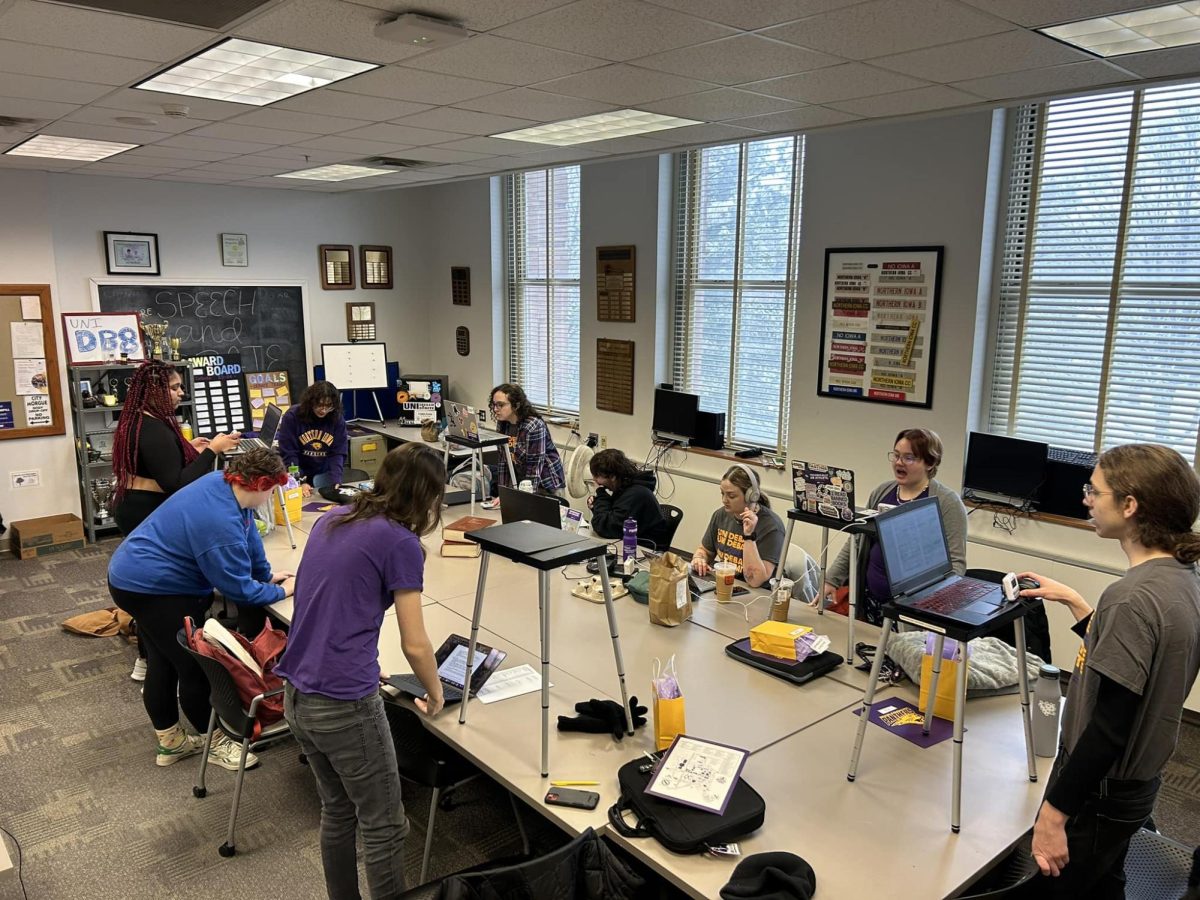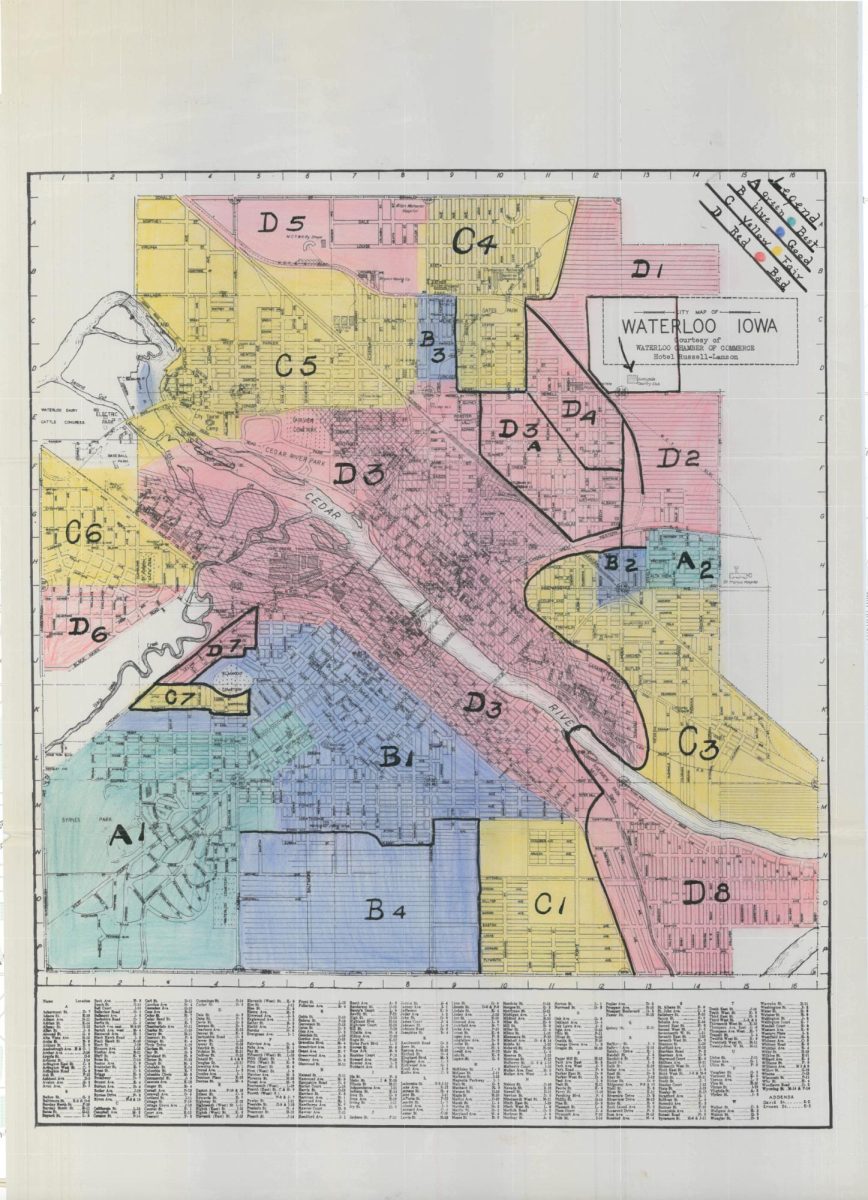Theatre UNI opened the 2014-2015 season with Pulitzer Prize nominee Rebecca Gilman’s 2004 dark comedic drama “The Sweetest Swing in Baseball.”
After a disastrous art exhibit following the steady decline of her career and rejection by her long-term boyfriend Roy, (Thaddeus Klenske, senior theatre major), Dana (Madeline Achen, senior theatre major) is admitted to a psychiatric ward after her attempted suicide.
She’s surprised to find relief from her constant paranoia and anxiety in the established daily routine and budding friendship between herself, recovering alcoholic Michael (Deng Xayasouk, senior theatre major) and celebrity stalker Gary (David Wasserman, senior individual studies major).
When the ten days that her insurance will cover in the ward are up, Dana concocts a plan to convince her psychiatrist, Dr. Gilbert (Erika Kuhn, sophomore theatre major) that she has a more serious mental disorder than suicidal depression.
She pretends she believes she is the infamous baseball player, Darryl Strawberry, of whom she knows next-to-nothing about but whose life parallels her own.
Unfortunately, The Sweetest Swing took a swing at themes and missed.
There were countless themes – the part mental illness plays in the creation of art, the commodification of creative works, the treatment of human beings as means rather than ends, work versus play, hypersensitivity to criticism, the nature of success, the failure of our health care system; the list goes on and on. All of these themes were introduced, some were dabbled in but none fully explored.
The same could be said of character revelations, which were neatly resolved with a one-liner and never mentioned again.
Despite this, the play did have substantial value as an exercise in the introduction of difficult material. It forced the audience to think, presenting unpopular, pessimistic positions with conviction so fierce, it’s convincing. Gary’s complete, unapologetic cynicism in lieu of Dana’s new found success was daunting, powerful and frighteningly persuasive.
What really saved this performance, however, was the actors.
Achen was a treat. She convincingly performed the unconvincing performance of Dana as Strawberry while imperceptibly conveying the permeation of Strawberry’s persona into Dana’s psyche. She successfully did exactly what her character couldn’t – she was rough, raw and inspiring.
Kuhn sweetened the deal. She was Achen’s opposite characterization. While Achen is highly expressive and visceral, Kuhn’s performance was subtle and nuanced. The script gave her little to work with and she went above and beyond expectation.
Kuhn expressed her emotions delicately through subtle facial expressions and slight gestures. With few words, she presented Dr. Gilbert’s frustration and jealousy of Dana’s success while also presenting her sincerity and earnest wish to see Dana’s recovery.
Wasserman’s stylized characterization as the sociopathic Gary was very well done and well played into the comedy of the production. His behavior and speech were hilarious and he was the most entertaining aspect of the production.
But it came at a cost. Gary is not a relatable person with a debilitating mental disorder – he’s a crazy person who is mocked and laughed at. It lessened the impact of his more dramatic, serious moments and missed the chance to humanize a misunderstood and misrepresented disorder.
Both the lighting and set were minimalistic and economical, doing more with less. The set design was especially creative in its doubling of spaces and contrasts.
The costume design deliciously stereotyped the eccentric, self-satisfied tastes of the art community and the harsh, clinical dress of the mental establishment.
There was satire in the shallow art dealer and snobby gallerist’s bright colors and self-serving designs, while the sincere recovering alcoholic and struggling artist modestly wore bland hues and basic designs.
Despite the script’s weaknesses, theatre associate professor, Steve Taft’s solid direction coupled with strong design and talent making “The Sweetest Swing in Baseball” worth attending and an overall enjoyable experience.
Its run continues Oct. 16-18 at 7:30 p.m. and Oct. 19 at 2 p.m. in the Bertha Martin Theatre (BMT). You can buy tickets online and at the Strayer-Wood box office.








